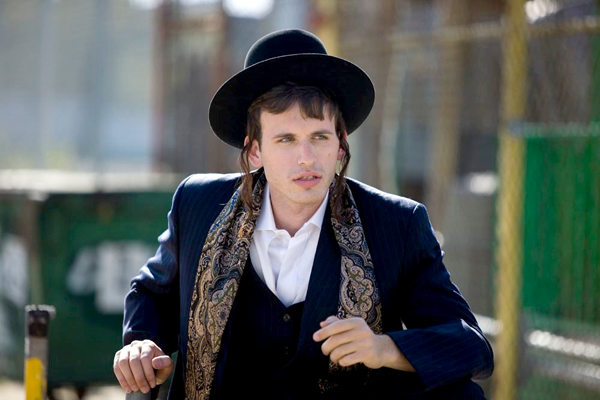|
Reviews of Recent Independent, Foreign, & Documentary Films in Theaters and DVD/Home Video

ROMEO & JULIET IN YIDDISH Romeo & Juliet In Yiddish blows away Shakespearean fairy dust on fusty nostalgic notions of classic Yiddish theater, with the exuberance of a lo-fi Baz Luhrmann in a West Side Story set in exotic Brooklyn. Movies don’t usually go much beneath the uniform look of ultra-Orthodox Jewish Hasids, not seeing beyond the men in black hats and suits and the women with their long skirts and covered heads. Boaz Yakin’s A Price Above Rubies (1998) exemplifies the clichés, while Diane Crespo and Stefan C. Schaefer’s Arranged (2007) was unusually uncritical about the restrictive lifestyle. Even rebellious portrayal haven’t gone much beyond a notorious case from the 1990s, when young Hasids were caught smuggling drugs into the U.S. (as in both Adam Vardy’s Mendy in 2003 and Kevin Asch’s Holy Rollers last year). Director Eve Annenberg delightfully avoids these stereotypes, setting her film in the fringes of the Williamsburg, Brooklyn shtetl. (In between her last film, 1996’s Dogs: The Rise and Fall of an All-Girl Bookie Joint, and this one, she worked as nurse and saw that shunned ex-Hasidic outcasts depressingly ended up too often with overdoses in the ER.) Using again a non-professional cast, she imagines that one such homeless “leaver” here is Zalman (David Germano), a Kabbalist who sprinkles around Puck-like magic. Annenberg also plays her movie persona Ava, a nurse and a graduate student who needs help with an assignment: to update a 1930’s Yiddish translation of Shakespeare’s Romeo and Juliet into the contemporary Yiddishkeit for a new, native speaking generation. (The subtitles include definitions and explanations.) With hang-ups about her own family and past religious experiences, Ava enlists the help of two enterprising young Hasidic drop-outs who have been fending for themselves on the streets, Lazer (Lazer Weiss) and Mendy (Mendy Zafir). They grew up with English as a second language at their yeshiva, and Shakespeare’s play was not part of their ninth grade curriculum, like it is in “normal Brooklyn,” as it’s called here. The antique story of love befuddles them until they can relate its conflicts to their own community’s tensions. The Montagues vs. the Capulets are like the Satmars vs. the Lubavitchers, two insular sects that brought separate rabbinical allegiances from Eastern Europe when they resettled in Brooklyn after the Holocaust. Backed by an entertainingly diverse score that updates traditional klezmer music with indie rock, the film’s charm ratchets up when it shifts back and forth between the nurse and her translators explicating the text and their enactment of the play in a very urban and Orthodox Jewish context. The nurse becomes Juliet’s Nurse, Tybalt and Mercutio fight on the Coney Island boardwalk, the masquerade ball is a lively gender-segregated Purim party, Romeo expounds his theories of love on the subway, the balcony scene takes place on a fire escape, and, of course, they are married by a rabbi instead of a priest. Juliet is the lovely Faigie (Melissa Weisz), whose on-screen chemistry with the sparkling bespectacled Lazer as her Romeo may have been stoked by their blossoming off-screen love life. (And with their steamy onscreen love scene, she has certainly burned her bridges with the traditional upbringing she left behind.)
The lovers’ suicide scheme takes on freighted
significance as the film frankly reveals the difficulties of life for
young people who flee the strictures of their ultra-Orthodox families
(and is true for any who leave fundamentalist communities with no skills
for the modern world). But they are also shown not rejecting Judaism
when Ava shares a joyous, musical Shabbat dinner with her mischievous
writing partners in their van full of friends. They have found a home
away from home in a new community of their own choice, giving a more
hopeful ending to the timeless tale of crosstown romance.
Nora Lee Mandel
|

